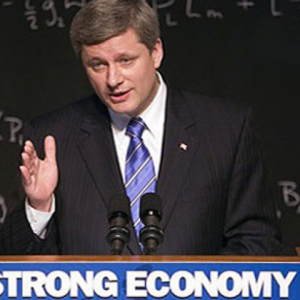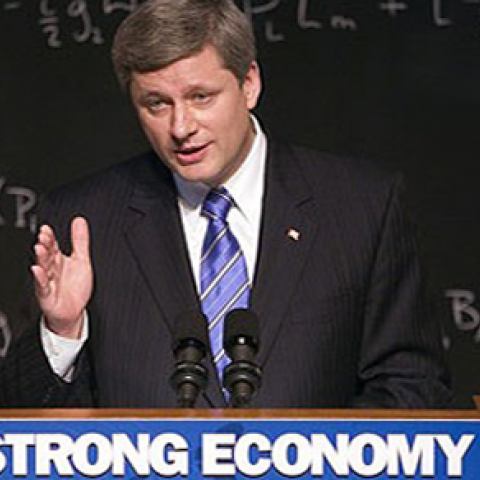
Stephen Harper steers Canada’s economy into a “prolonged period of misery”
…And now back to the economy. With Harper’s Conservatives cranking up the dial on over-the-top rhetoric on national security and a weird digression into issues of race and culture, Canada’s weakening economy has managed to dodge the attention it would have generated otherwise. Now we know why: things aren’t looking good. Falling oil prices have […]
…And now back to the economy.
With Harper’s Conservatives cranking up the dial on over-the-top rhetoric on national security and a weird digression into issues of race and culture, Canada’s weakening economy has managed to dodge the attention it would have generated otherwise.
Now we know why: things aren’t looking good.
Falling oil prices have exposed the fragility of Canada’s economy (as well as the risk in Harper’s strategy of putting all his eggs in the oil basket). With Harper’s house of economic cards beginning to look unstable, and given his reluctance to stimulate growth, Canada’s economy appears headed for a “prolonged period of misery.”
Here’s the news you may have missed:
1. Unemployment is on the rise across the country
Bad news came last Friday with Statistics Canada’s latest job numbers that show “widespread fallout” from falling oil prices:
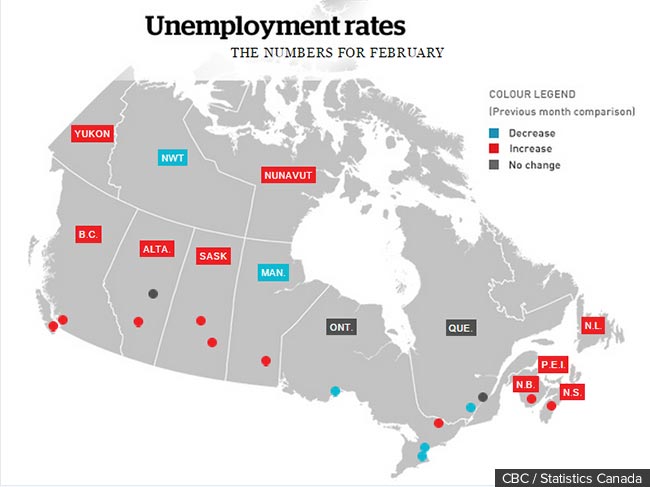
Alberta’s unemployment rate rose 0.8% to 5.8% — the province’s highest jobless rate since 2011. Meanwhile, a newly released forecast by construction industry association Buildforce is projecting three years of job losses in that sector — with an expected 20,000 jobs lost before the industry rebounds in 2018.
Elsewhere, BC lost 16,500 full-time jobs and saw its unemployment rate increase by 0.8 percentage points to 6% last month. Job losses were recorded in all western provinces (except Manitoba) and Maritime provinces. Ontario and Quebec’s job numbers remained unchanged.
Nationally, the number of Canadians with a job dropped 0.1% while the unemployment rate rose 0.2% to 6.8%. However, Laurentian University economics professor Louis-Philippe Rochon points out that when you factor in participation rates, “Canada’s real unemployment rate would be closer to 9 per cent today.”
CIBC forecasts “the peak in the national unemployment rate arriving toward the middle of the year.”
2. The depth of job losses have been significant
- Alberta’s oil industry has shed 20,000 jobs since the price of oil began to slip in September. A recent survey found that, while one third of companies in Alberta’s oil sector thought it was “too early” to say how they will react to falling oil prices, another third have planned to freeze hiring and 16% plan to reduce staff.
- Meanwhile, boom towns connected to natural resources have seen spin-off jobs in restaurants and retail take a hit from losses in the oil fields.
- Target Canada’s 17,600 layoffs accounted for the biggest single loss of jobs in 20 years since the collapse of the Newfoundland cod fishing industry, and the most of any one single company since the closure of Avro Canada (developers of the Avro Arrow) shut down in 1959.
- Trouble in Canada’s malls: In addition to seeing consumer spending fall to a four-year low, several major retailers including Sears Canada, Sony Canada, Bikini Village, Mexx Canada, Smart Set, Jacobs, and Walmart have either shut down or announced layoffs in recent months — and Alberta’s retail sector has been particularly hard hit.
3. The quality of Canadian jobs is in decline
And when you compare recent job losses with the quality of jobs in recent years, things start to look even more precarious.
A recent report from CIBC found Canadian job quality has hit a 25-year low — with part-time jobs rising “overwhelmingly” over full-time jobs:
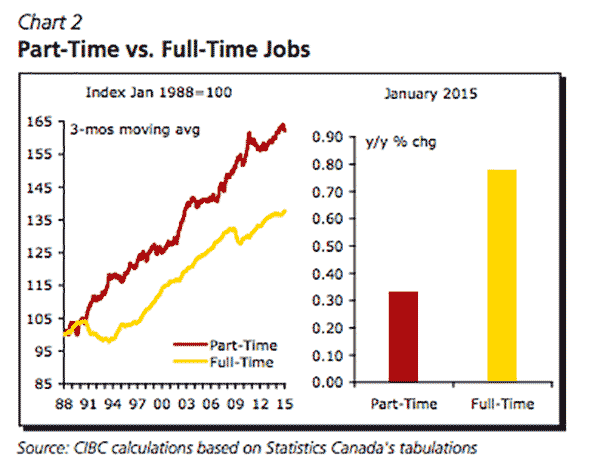
4. Canadian manufacturing jobs have plummeted to near record lows
And despite predictions that the drop in oil prices and the Canadian dollar could set the stage for a Canadian manufacturing comeback, Canada also lost 20,000 manufacturing jobs in February — driving total Canadian manufacturing jobs to the second-lowest level ever recorded by Statistics Canada’s Labour Force Survey, which dates back to 1976.

5. Women dropped out of the labour force in record numbers last year
Meanwhile, Canada ended 2014 with the largest number of women dropping out of the workforce since the early 1990s recession:
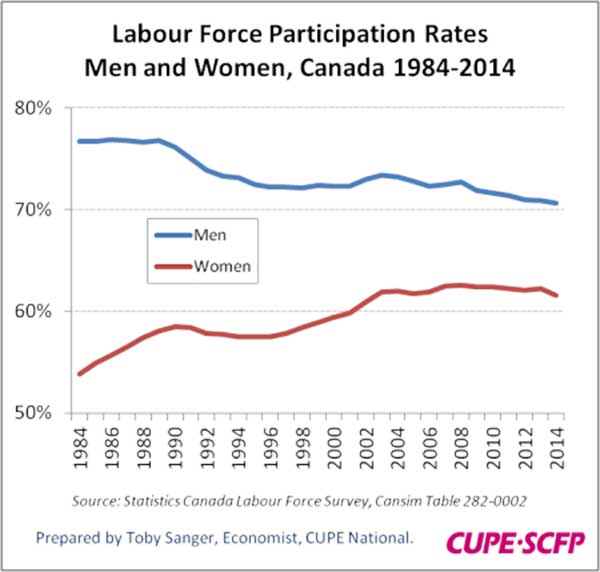
6. The oil industry hasn’t yet hit rock bottom
In a CIBC World Markets report that warns the “worst is yet to come,” economist Nick Exarhos says “oil’s impact is already being felt,” but “with the brunt of layoffs in the oil patch still coming, we’ll surely trend higher in Alberta’s unemployment figures this year.”
That’s echoed by Bank of Montreal senior economist Sal Guatieri who says “the worst is still to come,” and suggests Alberta and Newfoundland “will take the brunt of the hit.”
“Growth likely slowed to 1% in Q1, as lower oil prices led to the second largest shortfall in the goods trade balance on record in January,” Guatieri writes. “A reduction in energy-sector investment could slash non-residential investment by 8% this year.”
Photo: PMO.
Our journalism is powered by readers like you.
We’re an award-winning non-profit news organization that covers topics like social and economic inequality, big business and labour, and right-wing extremism.
Help us build so we can bring to light stories that don’t get the attention they deserve from Canada’s big corporate media outlets.
Donate

